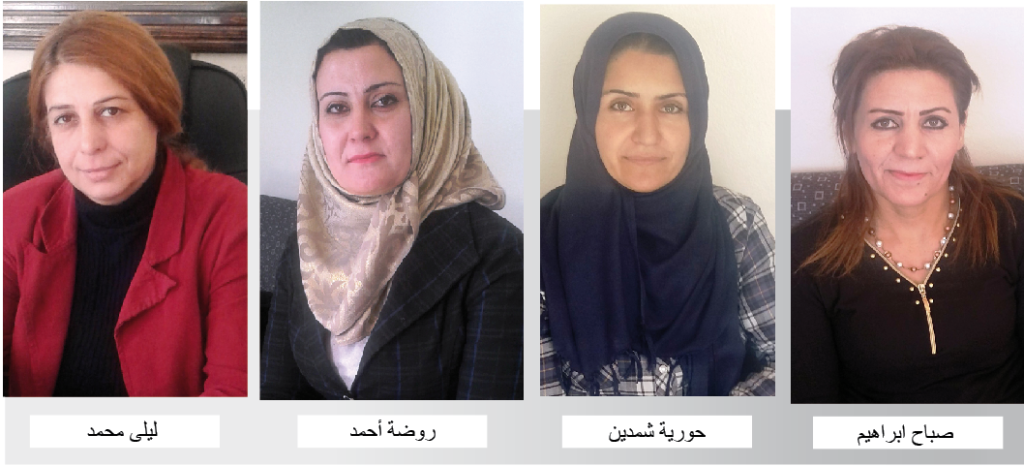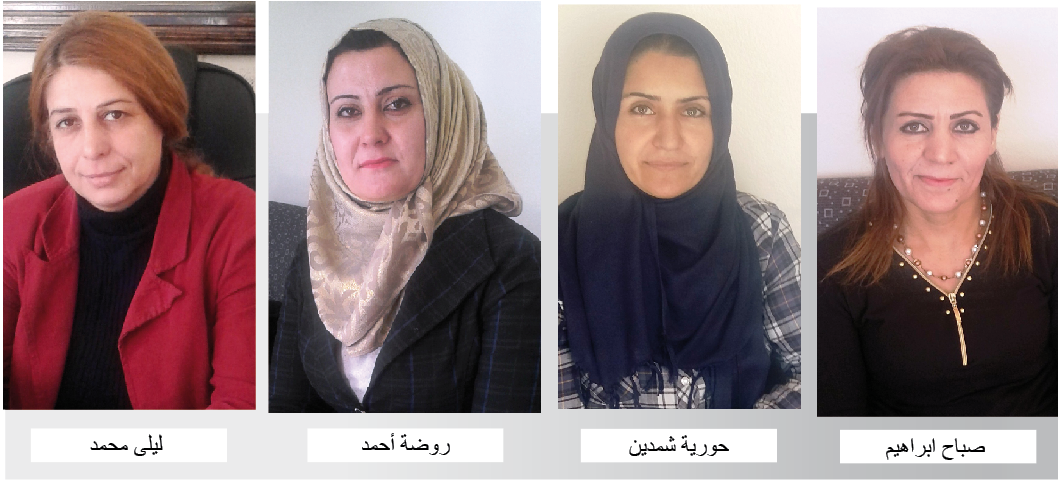Many things drive women to work, most notably economic reasons and the hardships of life. After the crisis in Syria, women had to find a position for themselves in society and to cooperate with men, especially in Rojava. Work also makes a woman feel that she is a valuable component of society and gives a sense of fulfilment through a professional or official position.
How can working women deal with two different environments and find a balance between home and work, especially considering the region’s social and cultural atmosphere, which remains highly sceptical about working women?
Women in Rojava have played a very important role in political and military struggles, and took many people in the world by surprise with their strong personalities, capabilities and great achievements. Women in Rojava were not content only with that, but continued their progress in all fields. Now here they are finding a place for themselves in the communal economy. Women established an Economic Council under the auspices of the Democratic Self Administration in Rojava, and founded many special cooperative societies for women.
In order to highlight the work of women in the communal economy, and know more about cooperative societies, Ronahi newspaper went to the headquarters of the Women’s Economic Council in the western neighbourhood of Qamishlo. There we met Bidaya, an administrator in the Women’s Economic Council, and Leila Mohammed, an administrator in the Movement for a Democratic Society [TEV-DEM], who said, ”We are working to educate women and develop their economic and social skills so that they come out of the framework of the mother and housewife, where they are being marginalised and devalued. Women have proved that they have the ability to work in all fields, and as we know, people with the patriarchal mindset think that women do not deserve to, and cannot work in the economic field. By establishing the Women’s Economic Council, we have proved them wrong. We’ve held several meetings and have taken a number of decisions in favour of women, related to establishing economic projects in the region. We have also elected three members from each neighbourhood to supervise them. We haven’t been able to include all the neighbourhoods in Qamshlo yet, but we’re in the process of achieving that. There were also some decisions in those meetings to appoint female administrators for the cooperative societies. The council has logged the observations and suggestions and distributed them to the communes in order to be implemented”.
The economy is the backbone of the community
Leila added, ”Through the communal economy we will break the siege on Rojava. The economy is the backbone of the community, and this will happen only through the participation of women, because women are half of the society and they will play a significant role in improving the economy. For a long time, women have worked hand in hand with men in the fields of agriculture, livestock breeding and industry. The administrators held a meeting to make important decisions and proposals to improve the communal economy, and they had discussions about the difficulties facing women who work in the cooperative societies, as well as how to overcome them.”
Cooperative societies
In order to shed some light on the cooperatives that women in particular work in, we had a meeting with Huriya Shamdîn, the coordinator of the coops in the Economic Council. “The Economic Council was established recently to assess the economic actions and projects that are going to start, according to our future plan. We have already started a number of projects, including a project for livestock breeding, preserving and planting vegetables. Lately decisions have been made to start a dairy factory in the Alantariyah neighbourhood, and also to establish an agricultural project in Terbah and Sabieh, and Qamishlo. We provided a 4,000 acre piece of land for this project. Planting will start after the project has been fully studied, and the dividends will be distributed to the members, according to the law, which is to distribute the dividends to the poor and needy members first.”
The economic projects
Another member of the Economic Council, Sabah Ibrahim, who supervises the cooperative societies, told us, ”We have a number of projects, including a mall in the Hilaliyah neighbourhood which has 15 female employees, and a project for planting vegetables in the Suez Canal neighbourhood. The women working on the project planted tomato, aubergine, pepper and other summer vegetables. At the end of the summer vegetable season, they will start planting winter vegetables like lettuce, carrot and radish, so that they can be sold in the market. There is another project to sell used clothes in the Antariyah neighbourhood, and a restaurant that has eight female chefs who make food for our institutions. There is another project for livestock breeding in Krasur village that currently has about 60 heads of sheep. The project is being managed by some of the neediest families there. There were decisions to work on a dairy project in the Antariyah neighbourhood; a group of women will work there and the project will be ready as soon as an appropriate space is available. In the field of agriculture, we are trying to rent a number of pieces of agricultural land to cultivate in Qamishlo and the neighbouring villages. We’ve managed to acquire a piece of land in Nafkry village and some other villages. 30 to 60 women have participated in the agricultural project. They have been chosen according to their financial situation, which was possible with the cooperation of the communes, who chose the neediest families. The council evaluates the situation of some of the members and allows them to participate in the projects without paying for the shares. These will be granted 5% of the interest value as a humanitarian gesture, considering their standards of living.”
The Economic Council in the Antariyah neighbourhood established a private market where a group of women work. We met a member of the Economic Council, Rawda Ahmed, who supervises the work in the market. She said, “We are currently establishing a market in the Antariyah neighbourhood that includes handmade products such as woollen clothing, winter food, dried vegetables and a lot of other related items. The market will be selling the products that come from our other projects. For example, the vegetables that the women grow in our agricultural project will be sold in the market, and the cheese and dairy will be made out of the milk that we get from the livestock-breeding project, so we are working on self-sufficiency as much as possible. This way we don’t have to import materials from outside Rojava.”

From left to right: Leila Mohamed; Rawda Ahmed; Houriyah Shamdîn; Sabah Ibrahîm

